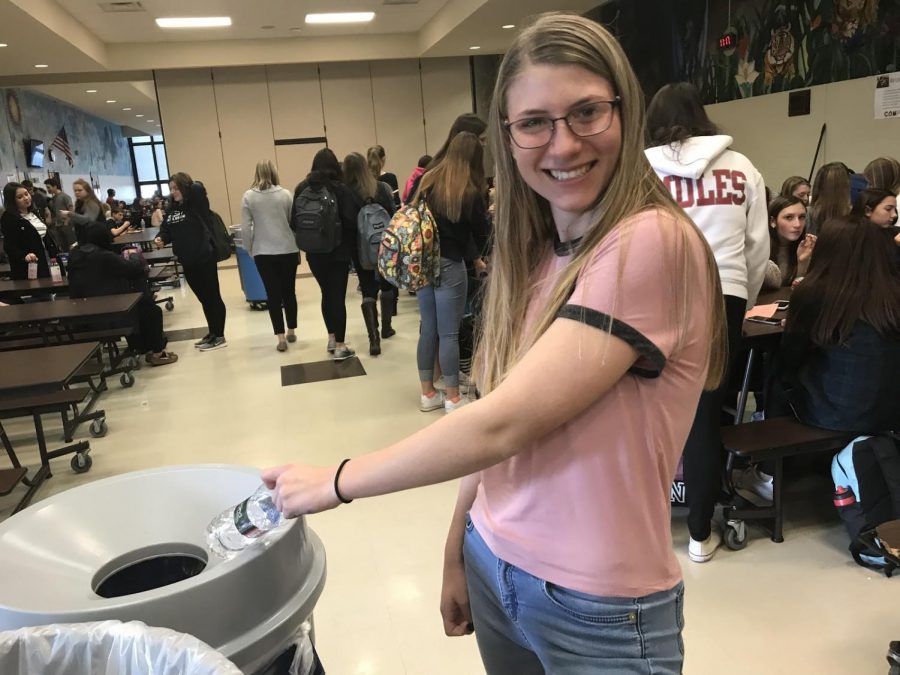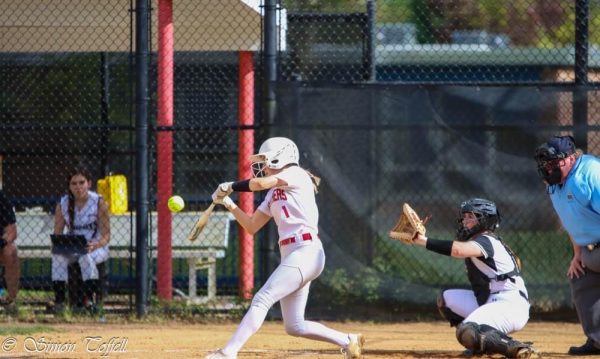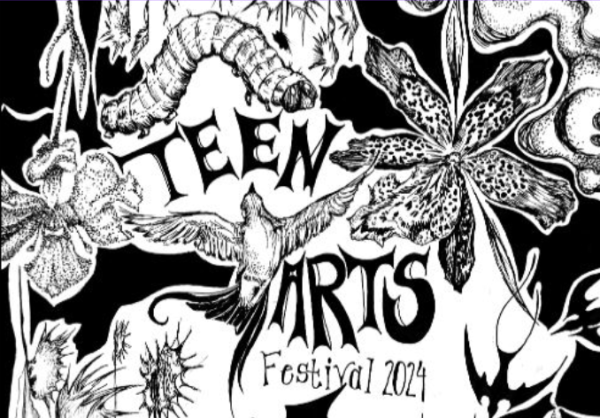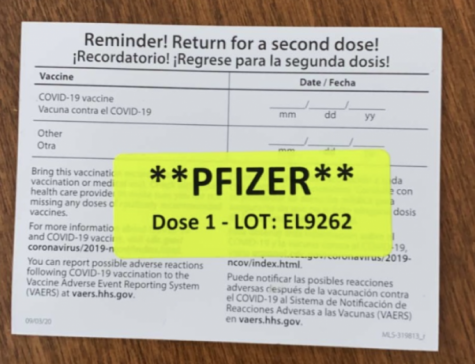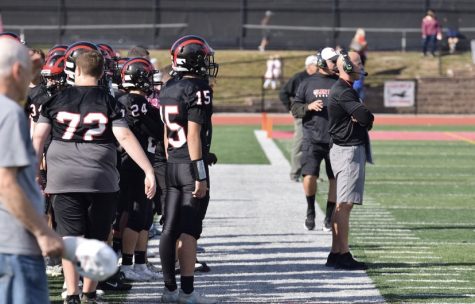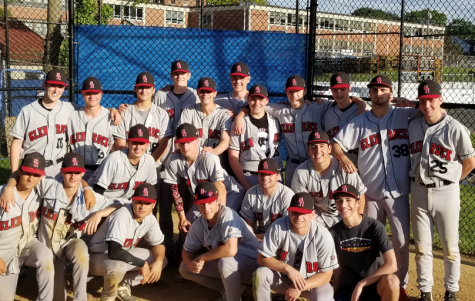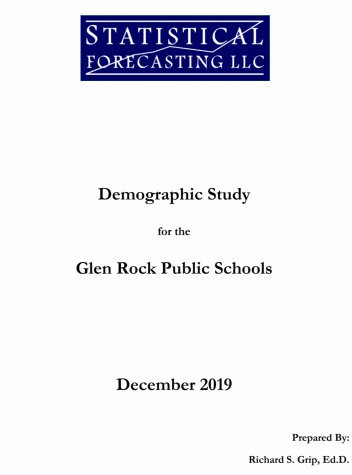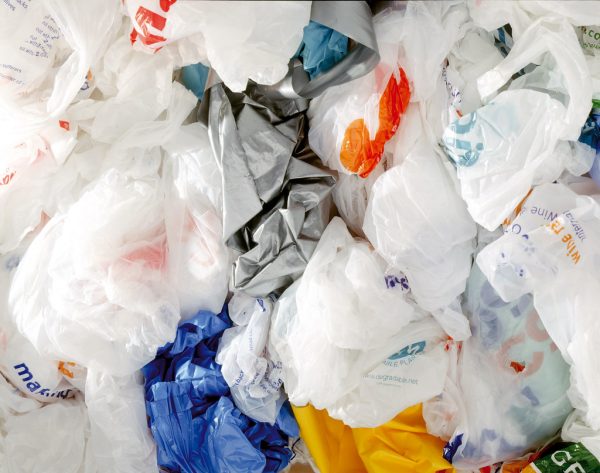Students get green and improve the environment
Glen Rock environmental efforts
When walking on Rock Road, past the small stores that decorate the street, one can notice the greenery and flowers lining the sidewalks. The sun is shining and the sky is free of smog. Past the train tracks and adjacent to Kilroy’s is Glen Rock Borough Hall. The building is home to the town council and many other departments, including the Glen Rock Environmental Commission and Green Team.
Girl Scouts, Boy Scouts, and other motivated students in the town spend their hours researching how they can help create a more sustainable community. They work together with the administration, teachers, and commission in order to make a difference in their town.
Students that are fascinated by environmental science meet in Room S-238. The room is connected to a flourishing greenhouse which is always available to students. School ends and some students go home while others stay and help out at the Environmental Club.
These people are working hard to make Glen Rock more eco-friendly. With only about 12,000 residents, many believe that efforts here cannot affect the state, country, or even world environment. Others disagree.
Glen Rock Environmental Commission
The central push for improving Glen Rock’s environment comes from within borough hall. In most New Jersey towns, there are environmental commissions that are a part of the local government. The Glen Rock Environmental Commission is made up of seven volunteers who advise the borough council and mayor on environmental action in the town. They also initiate many campaigns to educate Glen Rock residents about environmental issues.
Their most recent projects have dealt with renewable energy, recycling plastic film, and some other important topics. All of the projects are chosen based on the individual commissioner’s interests and passions.
“I feel like it’s mostly based on the passion of the commissioners or the Green Team members,” Commissioner Laura Occhipinti said.
The Green Team is a much more relaxed group that also works to make Glen Rock a greener place. While the environmental commission is made up of people who are officially sworn into the town government and are granted voting rights, the members of the Green Teamwork in a less structured dynamic.
“For me, that made a lot of sense, because it encourages you to help the environment,” Rabacchi said.
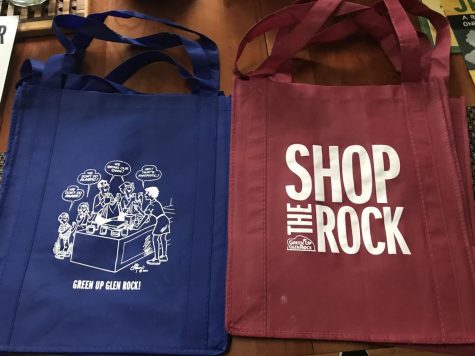
It is clear that the members of the environmental commission have a lot of passion and motivation. The co-chair of the commission, Sylvia Rabacchi, became involved in the commission in 2013 when her daughter became interested in the environment. However, she has been aware of environmental issues for a long time.
“I’m from Italy. I grew up there and went to school there, and I became a biologist. When I came here to live with my family, I saw there was a lot of waste, and there was a lot of careless behavior, I thought,” Rabacchi said.
Seeing the low motivation to help the environment can leave people feeling helpless, wondering how to help or if it is worth it. However, Rabacchi realized that a lot of traction can be gained from working at the local level. Similarly, commissioner Laura Occhipinti acknowledges that there is definite merit in working in a small town.
“I feel like we have the most control over what we do right here in Glen Rock,” Rabacchi said.
Energy
How much energy do you think you use in a day? More importantly, how does this affect our environment? The Glen Rock Environmental Commission has been working persistently to combat the carbon footprint of our community. As a co-chair of the commission, Sylvia Rabacchi is leading this mission.
A carbon footprint refers to the greenhouse gases emitted by a particular group or community. Despite the small size, Glen Rock’s heavy usage of cars and residential energy has lead
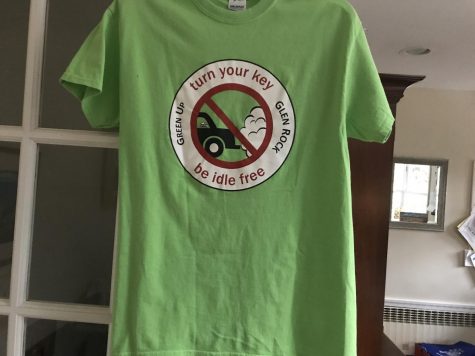
to heavy emissions. In 2014, our total emissions were calculated to be 83,042 metric tons of CO2. But before beginning campaigns, the Glen Rock Environmental Commission needed to find who the aim of their message was.
“We want to know who in the community do we need to target mostly if we want to reduce the carbon footprint,” Rabacchi said.
Rabacchi and the rest of the group have conducted a great quantity of research, even working with Glen Rock High School students to do so. Their precise calculations show that the emissions in Glen Rock are split between two main sources: heating gas and electricity. In our community, a large portion of the carbon footprint can be attributed to people’s homes, along with the many commercial businesses in town. The natural gases and energy used to power electronics have caused substantial detriment to our environment. Rabacchi and the commission realized that their target audience was Glen Rock residents. But what is being done now to combat this issue?
When thinking about reducing our carbon footprint, it can seem like a daunting issue for anybody. However, no act is too small.
“We really have to do a lot more to try to inform the residents that they can do in their own everyday life little things, like switching the light bulbs to LEDs, and keeping the thermostats down when you’re not home,” Rabacchi said.
The environmental commission, along with other conscious organizations and groups, have certainly led campaigns to show that everything counts.
However, Glen Rock is doing even more now. Rabacchi has been spearheading a campaign for a program titled DEAL, which is the Renewable Government Energy Aggregation Proposal Plan. Most of the residents in Glen Rock use PSE&G for the energy resources. DEAL would offer people using PSE&G to transfer to a program that offers a renewable energy component.
“This would be the best possible things we could do for greenhouse gases,” Rabacchi said.
DEAL was recently proposed to the Glen Rock council and passed, which could possibly reduce 25% or more of greenhouse gases in our town.
Sustainable Jersey
Another important goal of the Glen Rock Environmental Commission is to recertify Glen Rock as a sustainable and environmentally conscious town. The commission works with Sustainable Jersey, a nonprofit organization that supports communities by supplying tools, training, and financial assistance as they work towards this goal.
“Sustainable Jersey kind of keeps track of the action that each municipality is doing to become more sustainable,” Rabacchi said.
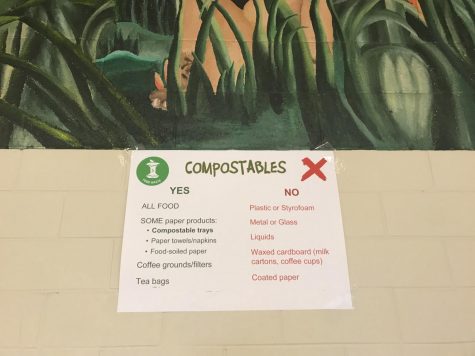
Their certification program uses a point system, in which towns gain points for their environmental actions. These actions are added up, leading towns to gain either bronze or silver certification. Glen Rock is at the bronze level, which means the town has a total of 150 points. Bronze certification also requires the establishment of a green team, 2 out of 12 priority actions, and completion of 6 out of 18 other actions. Municipalities must recertify every three years, and the environmental commission is working on that right now. The town must provide documentation for every action they complete.
“We’re just gathering all the projects that we’ve worked on, evidence, and submitting it into Sustainable Jersey,” Occhipinti said.
This is a long process, but it is worth it for the town. After being certified, the town is eligible for assistance in the form of training and grants. The commission has already received several grants, and they have applied for two more.
The commission has also recently engaged in the Trex Plastic Recycling Challenge, in which towns across the nation compete to collect the most plastic film. Recyclable items include grocery bags, dry cleaning bags, bubble wrap, salt and cereal bags, and other soft plastics. For every 500 pounds collected, Trex gives a bench to the town.
Student Efforts
In the bustling cafeteria, Glen Rock High School students eat their lunches and talk with friends. On the lunch line, students grab trays for their food, often unaware of the biodegradable nature of them. Posters line the walls, spreading messages about healthy eating and recycling and composting. When students finish eating, they toss their scraps into the three different sets of garbage cans. Some are aware of the recycling bins and composting cans. Others nonchalantly chuck their plastic bottles into the trash can and recycle their styrofoam. However, some motivated students have noticed this glaring problem in recycling habits at the school.
Emma Mangino, a junior at Glen Rock High School, has been continuing a project that targets composting in the high school. Composting is a process in which organic matter is decomposed and recycled so that it can be added to fertilizer. Last year, Erica Jones received a grant to create a composting program in the school. Large composting bins were set up next to the usual recycling and trash bins and were completed with signs that listed items that were and were not compostable. Compostables include all food, coffee grounds and filters, tea bags, paper towels and napkins, food-soiled paper, and compostable trays, which were installed in the cafeteria. Posters were also hung around the cafeteria educating and encouraging students to compos
After graduating, Jones decided to give the task of continuing this project to her friend Emma Mangino. Mangino’s jobs have included “talking to people at the company and arranging the janitors, and trying to get kids to compost, getting it on the announcements,” says Mangino. This project has allowed for more people to learn about what composting is and why it is important. Additionally, the effectiveness of this project and the dedication shown by the Jones and Mangino portrays the difference this work can make.
“Every little thing helps, and although it seems like we are a small town and it’s not going to help, it really does. Because if every tiny town does something, then think about the impact,” Mangino said.
Girl Scout Lizzie Hoyt decided to tackle teenage recycling habits for her Gold Award project. For her, the inspiration began while watching students in the school.
“People just put their trash and put their recycling in any bin that they want without even considering what color it is,”Hoyt said.
The Girl Scout noticed that there is a large discrepancy in knowledge regarding what is and is not recyclable, not just in our school, but in the Glen Rock community as a whole. So, when faced with the challenge of creating a project for her 80-hour service project called the Gold Award, which is the highest level of achievement for a Girl Scout, Hoyt immediately knew that she wanted to address this issue.
“I am confronting the community issue of recycling in Glen Rock because many teenagers don’t actually know what is recyclable and that’s the main issue and that’s the main disconnect for why people don’t recycle,” Hoyt said.
Hoyt is doing this by creating public service announcements in the form of short videos, that will take place at local Glen Rock businesses and feature commonly recognized faces from town. She hopes that this will show people that recycling items properly is an easy way to help our local environment and educate people about the importance and prevalence of this issue.
Environmental Club
Within the high school, the Environmental Club also works to improve the environment and educate students. The club is advised by Mrs. Heather McDermott, who teaches AP Environmental, CP Environmental, and Biology. McDermott has been advising the club for fifteen years and has seen the club’s programs improve and grow.
One of the most successful and recognizable projects the club has worked on is Fourth Grade Water Day.
“Fourth Grade Water Day started with just the environmental club, and we would meet down at the arboretum with some kids from different classes in the fourth grade. And that was nineteen years ago when it started,” McDermott said.
Through the years, this project has grown to incorporate every single fourth-grade student in the district, with the entire club and all environmental students presenting and facilitating the program. The program focuses on water conservation, and the kids learn through many hands-on activities.
“It’s kind of an environmental field day,” McDermott said.
The environmental club also coordinated with the Glen Rock Environmental Commission. The students have helped with the town clean-ups and worked in the arboretum, and even gone to commission meetings and movies the commission has presented. Currently, the club and environmental classes have been bringing in plastics to help with the Plastic Film Recycling Challenge. Working with students at the high school helps the commission to enact change and reach a wider audience.
McDermott also focuses on the importance of improving the environment in her classes and has found that the best way to teach it is to have the students experience the process. The classrooms and courtyards have composters and gardens that the students tend to.
“Everything goes into the composters, and we compost the material and use it as soil. So they see, and they actually put the material into the composter, and take it out as soil and put it back into the garden,” McDermott said.
McDermott acknowledges that it is vital for the students to witness the full cycle of composting to truly understand how our actions affect our surroundings. She teaches her students that helping the environment now will affect their lives forever.
“I’m a firm believer that we live in the environment and if we pollute it, we’re poisoning ourselves,” McDermott said.
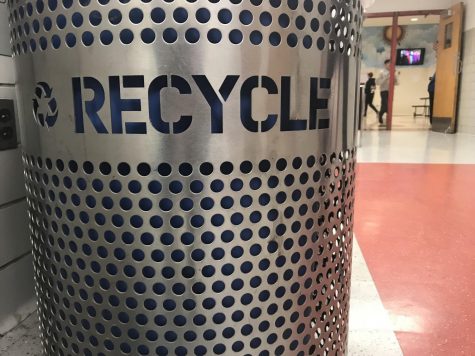
For example, when plastics are disposed of incorrectly, they often enter our water system. Later, the plastics can be found inside of fish and other seafood that people eat. Similarly, air pollution now will lead to significant repercussions later.
Throughout its years, the environmental club has assisted Glen Rock High School in becoming more eco-friendly. Each year, more and more is done. Most recently, the introduction of student laptops and overall conservation has significantly reduced the amount of paper used at the school. The use of compostable trays and bins in the cafeteria, along with the new water fountains has also made the school more environmentally conscious.
How Can You Help?
Many groups and individuals are working to create a more sustainable environment in Glen Rock. For the environmental commission, responses vary.
“I think DEAL got some pushback from some people, but the recycling plastic, I feel like the community’s 100 percent on board and participating. There was overwhelming support for the farmer’s market,” Occhipinti said.
Often, projects that do not pose a major change for Glen Rock residents are more likely to be supported.
The importance of plastic recycling is something that people have been aware of for many years, so campaigning for a program to increase this is not difficult. However, reusable energy is a relatively new concept for many residents. Still, the fact that DEAL passed proves that Glen Rock residents are dedicated to helping the environment. Rabacchi also says that projects like town clean-ups are not protested.
“Some projects are harder, for example, we have been trying for years to raise awareness on plastic bags,” Rabacchi said.
This is because while the commission has given residents reusable shopping bags, they can never ensure that people will actually use them. If a fee were to be placed on plastic bags, there would be the backlash.
Everyone trying to improve Glen Rock’s environment agrees that residential involvement is key. Occhipinti says that although residents rarely come to Glen Rock Environmental Commission monthly meetings, they should. Commission meetings can educate people about what is being done, and show them how to help. However, people do come to Green Team meetings, either to learn or take on projects themselves.
“The environmental commission, we love to work with students. We are always looking to get students every year,” Rabacchi said.
The commission wants to educate students and get them involved so the movement to improve the environment can continue for many years to come. Similarly, McDermott agrees that more students should get involved.
“I think environmental science should be a class that every single student who graduates high school across the country should take,” McDermott said.
The school’s administration has also been very supportive of projects done within the high school. For people looking to make a change in the environment, many offer advice as to how to take on a project.
“Don’t try to tackle something that’s too big. You can start off on a small scale. And make a difference where you are, you don’t have to solve all environmental issues in one go. Just do something you can handle,” Hoyt said.
Occhipinti recommends attending meetings at Borough Hall. “You’ll make great connections and they’ll be able to assist you in the ways that you want,” Occhipinti said.
Meetings, whether it be for the Green Team, environmental commission, or the environmental club at school can provide resources and advice.
Despite the small size of Glen Rock, significant steps are being taken. Whether it be composting, recycling, energy conservation, or simply cleaning up the town, residents show dedication at the local level.



